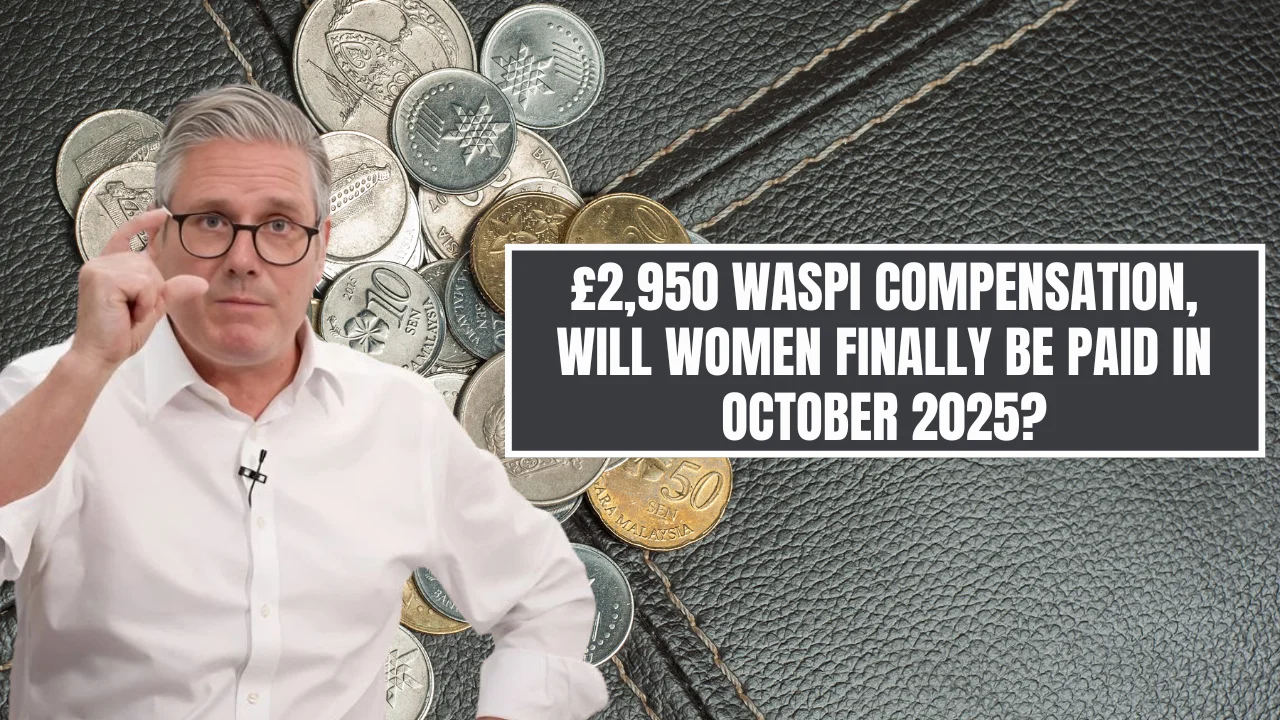£2,950 WASPI Compensation 2025: If you are one of the millions of women born in the 1950s who were affected by sudden State Pension age changes, then the phrase £2,950 WASPI Compensation 2025 has likely caught your attention. You may have heard stories on the news, seen social media campaigns, or even signed a petition yourself. It is more than a trending topic. For many, it is about justice, fairness, and financial security in retirement. The Government admitted there was a communication failure, but as of now, no money has been paid.
The £2,950 WASPI Compensation 2025 is not just about numbers. It represents recognition of the hardship these women endured after pension age changes blindsided them without proper notice. The fight is still ongoing, and this article breaks down everything you need to know, from legal battles to potential payout timelines. Let us walk through the most important updates and what they could mean for those affected.
£2,950 WASPI Compensation 2025: The Fight for Recognition Continues
The fight for £2,950 WASPI Compensation 2025 is now reaching a crucial stage. Women Against State Pension Inequality (WASPI) have been campaigning since the changes began to hit hard, and finally, in 2024, a major milestone occurred when the Government acknowledged maladministration by the Department for Work and Pensions. Despite this, the proposal for compensation was rejected. The figure £2,950 comes from the highest bracket recommended by the Parliamentary and Health Service Ombudsman. It is seen as a fair remedy for non-financial injustice caused by the delay in telling women about their pension age changes. However, legal and political resistance remains. The High Court hearing scheduled for December 2025 may determine whether affected women ever receive this payment.
Overview Table: WASPI Compensation Key Details at a Glance
| Topic | Details |
| Affected Group | Women born in the 1950s |
| Issue | Poor communication on State Pension age increase |
| Government Response | Admitted maladministration, rejected compensation scheme |
| WASPI Action | Legal challenge through judicial review |
| Court Protection | Cost-capping granted to protect from heavy legal fees |
| Compensation Proposal | £2,950 per woman as recommended by PHSO |
| Estimated Women Affected | Around 3.5 to 3.8 million |
| Total Potential Cost | Over £10 billion |
| High Court Hearing Date | December 9–10, 2025 |
| October 2025 Payout Possibility | No payout possible under current legal or administrative status |
DWP Mismanagement Findings and Government Response
Between 2005 and 2007, the DWP failed to directly inform women of changes to their State Pension age. This 28-month delay was found to be maladministration by the PHSO. The report confirmed that women were not given enough time or information to plan their retirement. Many were forced to continue working unexpectedly or faced financial hardship.
The Government acknowledged this failure in December 2024 but refused to pay compensation. They argued that by 2006, most women already knew about the pension age changes through other channels, like media coverage. Ministers also claimed that sending letters would not have made a meaningful difference, as only about 25 percent of people open unsolicited mail. On top of that, they said the cost of paying compensation to millions would be too high for taxpayers to carry.
Legal Challenge and Cost Protection
Faced with rejection, WASPI took the legal route. They secured cost protection in 2025, which was a huge win. This means that even if they lose in court, they will not be left with massive legal bills. This allowed the campaign to move forward confidently with their judicial review.
The upcoming court hearing on December 9 and 10, 2025, will look at whether the Government’s decision to deny compensation was irrational or procedurally unfair. If the court agrees with WASPI, the Government may be required to revisit the decision. However, the court cannot force the Government to pay compensation. Any actual payout would still depend on ministers, Parliament, and official processes being created after the court decision.
Who Could Be Eligible – and What the Liability Might Be
If the Government does reverse its decision after the court case, compensation will most likely go to women born in the 1950s. This group is estimated to be around 3.6 million women who were affected by the pension age change without being properly informed.
The estimated cost depends on how much is paid per woman. At the £2,950 level, the total cost would be around £10.6 billion. To lower this figure, the Government could decide to set strict eligibility criteria or pay different amounts based on the level of impact. There is also the question of whether families of women who have passed away will be allowed to claim on their behalf. These are all decisions that would be made during the scheme design process, if it happens.
Timeline and status of key developments
There is a lot of hope that something will change soon, but let us be clear — no scheme is in place right now. The timeline shows the major events so far, including the PHSO’s final report in March 2024, the Government’s rejection in December 2024, and the legal progress through 2025. The most important upcoming date is December 9 and 10, 2025, when the High Court will finally hear the case.
Without a scheme approved by Parliament, and with no administrative plan in place to accept claims or pay money, there is no realistic path for payments in October 2025. This is despite the excitement and speculation around this date. Only a dramatic political shift or emergency legislation could make that happen.
Barriers to October 2025 Payday
Some headlines have created false hope, but here is the reality. No payments will be made in October 2025 because the necessary steps have not happened yet. The Government has not approved a compensation scheme. The DWP does not have a process for reviewing claims or sending out money. The court date is after October, so even a positive decision would come too late to meet that timeline.
And even if the court agrees with WASPI, there is still a long way to go. The Government would need time to design the compensation system, secure funding, define eligibility, and create a secure platform for processing applications. That could take months, possibly longer. So for now, the October payout remains just a rumour.
Political Resistance and Public Pressure
While the legal side is moving forward, the political battle continues. The Government still insists that a compensation scheme would be too expensive and unfair. They believe that many women were aware of the changes in time and do not qualify for a payout. However, campaigners argue that this completely ignores the personal impact on those who were caught by surprise.
Public support for WASPI is growing. More Members of Parliament are backing the campaign and raising the issue in debates. Some warn that continued refusal could lead to voter backlash, especially among older women who feel abandoned by the system. The court decision in December might be the turning point, but political pressure will still be key to securing real action.
What Happens After the December Hearing?
If the court rules in favour of WASPI, the Government will likely be required to rethink their stance. They would need to draft a new policy, possibly consult with those affected, and present a compensation plan to Parliament. Only after that can payments begin. And if the court sides with the Government, it could be the end of the road for this round of the fight.
Even with a win, payments might not happen until late 2026 or beyond. This is because building a fair and secure compensation scheme from scratch takes time. But for now, all eyes are on December 2025, when the courts could finally push the Government to take this issue seriously.
FAQs
It was recommended by the Ombudsman as a Level 4 compensation band for significant non-financial injustice.
No. There is no confirmed scheme or payment process in place for October 2025.
No. The court can only order the Government to reconsider its decision, not enforce payments directly.
Likely women born in the 1950s who were affected by the delayed communication about pension age changes.
That depends on how the future compensation scheme is designed and whether such claims are included.












